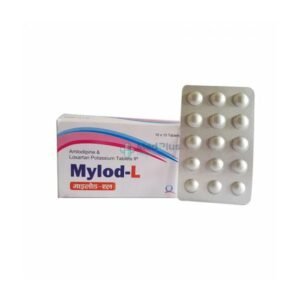No products in the cart.
Tazloc-40
₨ 273.00
- Tazloc 40 mg Tablet contains telmisartan, an angiotensin II receptor blocker (ARB), used to treat high blood pressure (hypertension) and reduce the risk of heart attacks and strokes.
Common Side Effects:
- Upper respiratory tract infections
- Back pain
- Sinus inflammation
- Diarrhea
Dizziness
These side effects are generally mild and tend to resolve as the body adjusts to the medication.
Precautions:
- Pregnancy and Breastfeeding: Tazloc 40 mg Tablet is not recommended during pregnancy due to potential harm to the developing fetus.
- Kidney and Liver Conditions: Patients with severe kidney or liver diseases should use this medication cautiously.
Alcohol Consumption: Avoid alcohol while taking this medication, as it can enhance the blood pressure-lowering effect and may increase the risk of side effects like dizziness.
Note: This information is intended for educational purposes and should not replace professional medical advice. Always consult your healthcare provider for personalized guidance and before making any changes to your medication regimen.
- Tazloc 40 mg Tablet contains telmisartan, an angiotensin II receptor blocker (ARB) primarily used to manage hypertension (high blood pressure) and reduce the risk of cardiovascular events such as heart attacks and strokes.
Mechanism of Action:Telmisartan works by selectively binding to angiotensin II receptors in the smooth muscles of blood vessels and adrenal glands. This action blocks the effects of angiotensin II—a hormone that typically constricts blood vessels and stimulates aldosterone release—leading to vasodilation (widening of blood vessels) and reduced secretion of aldosterone. These combined effects help lower blood pressure and decrease the workload on the heart.
Uses:
- Hypertension: Tazloc 40 mg Tablet is prescribed to lower high blood pressure, thereby reducing the risk of complications like heart disease, stroke, and kidney damage.
Cardiovascular Risk Reduction: It is also utilized to minimize the likelihood of serious cardiovascular events, including heart attacks and strokes, especially in individuals with additional risk factors such as diabetes.
Dosage and Administration:The typical starting dose is 40 mg once daily, taken orally with or without food. Depending on the patient’s response and medical condition, the dosage may be adjusted by the healthcare provider. It’s essential to take the medication at the same time each day to maintain consistent blood levels.
Side Effects:
Common side effects may include:
- Upper respiratory tract infections
- Back pain
- Sinus inflammation
- Diarrhea
Dizziness
These side effects are generally mild and tend to resolve as the body adjusts to the medication. However, if they persist or worsen, it’s advisable to consult a healthcare professional.
Precautions:
- Pregnancy and Breastfeeding: Tazloc 40 mg Tablet is not recommended during pregnancy due to potential harm to the developing fetus. Its safety during breastfeeding has not been established; therefore, consult your doctor before use.
- Kidney and Liver Conditions: Patients with severe kidney or liver diseases should use this medication cautiously. Dose adjustments and regular monitoring may be necessary.
Alcohol Consumption: Avoid alcohol while taking this medication, as it can enhance the blood pressure-lowering effect and may increase the risk of side effects like dizziness.
Drug Interactions:
Tazloc 40 mg Tablet may interact with:
- Nonsteroidal Anti-Inflammatory Drugs (NSAIDs): Concurrent use can reduce the antihypertensive effect and may impair kidney function.
- Diuretics: Combining with diuretics can enhance the blood pressure-lowering effect but may also increase the risk of kidney problems.
Potassium Supplements or Potassium-Sparing Diuretics: These can lead to elevated potassium levels in the blood, necessitating regular monitoring.
Storage:Store Tazloc 40 mg Tablet in a cool, dry place away from direct sunlight. Keep it out of reach of children and pets.
Note: This information is intended for educational purposes and should not replace professional medical advice. Always consult your healthcare provider for personalized guidance and before making any changes to your medication regimen.








